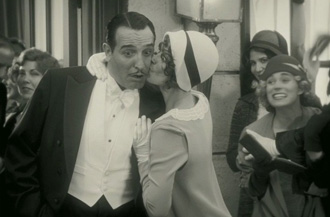BOP Interview: Michel Hazanavicius
By Ryan Mazie
November 25, 2011
Was there ever a worry though if audiences would see a movie in a style they are unaccustomed to nowadays?
MH: I don’t know how things will go, but when we decided to make the movie, so many people said, “You can’t do it. No one will come.” So when I found this producer who was very courageous who found money and financing, we decided we might lose money. But we wanted to do a prestige movie. … Let’s say you make three movies. If you lose money on this one, we are going to make another one and another one. And finally after three movies, you are going to win some money (pauses) I hope (laughs). But let’s try with this one. A prestige movie that can go on festival and we can sell all over the world, because it is silent. But we need to make a good movie for that if we want to sell it. If it’s not good, it’s worth zero.
In France, we finance movies with TV channels, and they don’t want black and white, they don’t even think of silent movies. For this one, they accepted to do it, but I think it is a cinema proposition. It isn’t a TV movie, it’s cinema. People can come to theaters to see it, but when we say audience, there are two expectations of the word. There is the audience of who are in the theater and then there’s the audience as in everyone who can potentially go to the theater. I take care of the people who are in the theater. The others I can do nothing about.
I love how the movie is a silent film but also tributes the genre. So I was curious about the genesis of the project – when you first started to develop it, was it always about being a tribute or did you consider making a dramatic film as opposed to a comedy or romance at some point? Was it more important to make a silent film or a tribute to a silent film?
MH: What was very important was to make a silent film, for me. I thought of doing a silent movie for ten years. I had a lot of stories that could fit in a way. But when I started to work on the story that became the most important thing because people don’t care about the genesis. They just want a simple story and have a good time – which is what this movie is about. So when I started to work on the story, I thought it was making sense, because it was easier for people to accept seeing a silent film about a silent actor. It’s more obvious.
Did those other ideas you had for the film become the silent films within the movie?
MH: Yeah, the opening [spy] sequence was one option for the script. … So it was one way to do a hero story like Mandrake the Magician was another. It was also an idea to make a spy movie or adventure movie, because action sequences don’t need dialogue so it was easy for people to accept it.
What was it like to shoot on location?
MH: It was a wonderful experience. … We were doing an American movie with a French production, so for me that is a big difference, because the French way to make a movie, it is the director who makes all the decisions. I’m not sure if it is always the same thing here. I think that in a lot of movies the boss is the producer in America. So we had all of the benefits of the French production and all of the benefits of an American production.
When we were scouting locations, it was very touching for me. We were in a lot of accurate locations of that period. [We shot in the] offices and studios of Charlie Chaplin, the studio of Douglas Fairbanks. The house of Peppy Miller in the movie is Mary Pickford’s house. … So it was very touching to go to all of these locations, but when we shot the movie I didn’t have time to think of that. [We shot] the movie in 35 days, so very short.
Continued:
1
2
3
|
|
|
|




